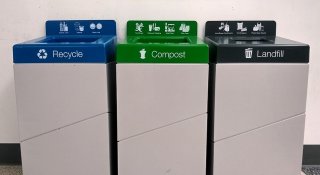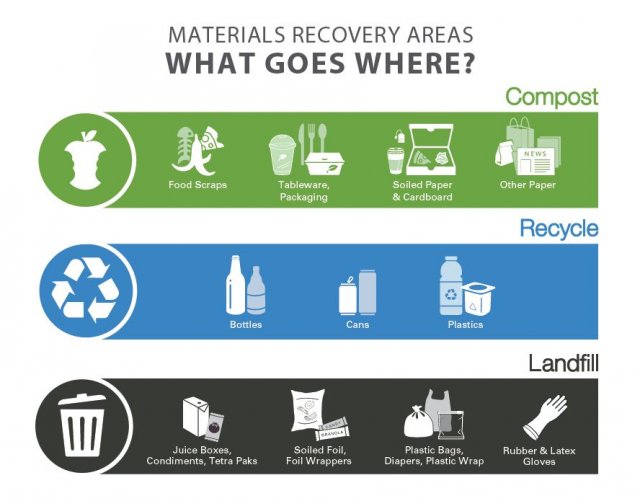Zero Waste Case Study: San Francisco International Airport (SFO)

- Goals and Standards
- Ongoing Internal Programs
- Airport Employee Initiatives
- Advantages
- Disadvantages/Omissions
Goals and Standards
As outlined in the airport’s Strategic 5-Year Plan, SFO’s goal is to become the world’s first zero waste Airport. SFO’s Zero Waste Plan (24 pp, 1.44 MB) outlines a suite of measures to achieve zero waste and work towards becoming a Closed-Loop Circular Campus that will manage material inputs to maximize recycling and recovery and minimize waste materials generated onsite. This is achieved through ambitious policies, codified in SFO’s Airport Environmental Standards in its Rules and Regulations, which apply to airlines, restaurants, retailers, and permittees.
SFO is a Department of City and County of San Francisco and so must also achieve these agency-wide Zero Waste Commitments to:
- Reduce solid waste generation by 15% by 2030 (reducing what goes to recycling, composting, and trash).
- Reduce disposal to landfill and incineration by 50% by 2030 (reducing what goes in the black trash bins).
Ongoing Internal Programs
Campus-Wide initiatives include:
Metrics Management
- Tracking Diversion Goals: In partnership with its waste hauler, materials waste tonnage and diversion are tracked to measure progress.
- Waste Materials Surveys and Characterizations: Annual waste surveys are conducted in its Material Recovery Areas (compactor and bin enclosures), utilizing the data to inform and update specific programmatic and outreach efforts.
Material Recovery Area Upgrades
- Standardization: A Material Recovery Area standard that includes streamlined consistent signage, interior trio bins and exterior bins. SFO’s Material Sorting Bins Design Documents are published on its website.
- Construction & Demolition Debris Management (C&D): Construction projects are required to achieve 75% diversion in compliance with SF Environment Code Chapter 7.
Materials Procurement and Management
- Zero Waste Concessions Program: This program eliminates single-use plastic waste by requiring all food ware and accessories to be either reusable or BPI-certified compostable. All beverages are also required to be plastic-free in either reusable, recyclable aluminum or glass, or BPI-certified compostable containers.
- Food Donation Program: The Unites Against Hunger Food Donation Program provides an avenue for Airport tenants to donate excess food to the Bay Area community. Approximately 13,000 meals are donated annually.
- Innovative Recycling solutions: A glove recycling program pilot at the SFO Museum and a security checkpoint diverted one ton of nitrile gloves into new products such as flooring products.
- Trainings: Zero Waste/Sustainability trainings are provided to staff focused on SFO’s sustainability efforts and a hands-on exercise called “What Goes Where” to educate employees and tenants on proper sorting.
- Green Business Program – Market-Based Mechanism: This robust eco-concierge service offers Green Business Certification to all Airport businesses. Businesses are incentivized to participate by receiving a discount on their trash permit fees after completing a sustainability requirements checklist.
Airport Employee Initiatives
- Zero Heroes: Employees are engaged through the Zero Heroes Program, which includes a monthly speaker series. This has previously featured “Zero Waste Hacks” as well as employee-led waste surveys.
- Focus groups: Focus Groups are conducted with key stakeholders, such as the custodial team, to identify challenges and propose solutions to resolve issues to improve waste collection/sorting process adapted to operation needs.
- Zero waste party kit: The Zero Waste Events policy encourages proper sorting (increased diversion) and promotes reusables at SFO events. A reusable party kit is available for small department events.
- Office standardization and centralization: Centralized waste collection was piloted at one of the main admin campuses and will be expanded to new office spaces, via a new standard that also aligns with the requirements of the TRUE Rating System.
Advantages
- All terminal trios (compost, recycle, landfill bins) are streamlined with color coded liners to help custodial teams easily identify and place in the proper exterior bins.
- Paper towels in terminal restrooms are composted to increase diversion.
- Zero Waste Concessions Program eliminates single-use plastic foodware and beverage containers.
- Liquid disposal bins are installed at every security checkpoint to reduce liquids in recycling bins and increase recycling. Additional liquid disposal and recycling bins are added to capture more recycling after passengers have already entered the security lines.
Disadvantages/Omissions
- Improper sorting by passengers in the terminals remain a challenge despite streamlined signage on all the standardized bins.
- Tenant staff turnover and the variety of subcontractors make it challenging to ensure consistency in proper disposal of materials from aircrafts and tenant spaces.
- Reusable foodware is available in a limited capacity due to a lack of dishwashing infrastructure.


